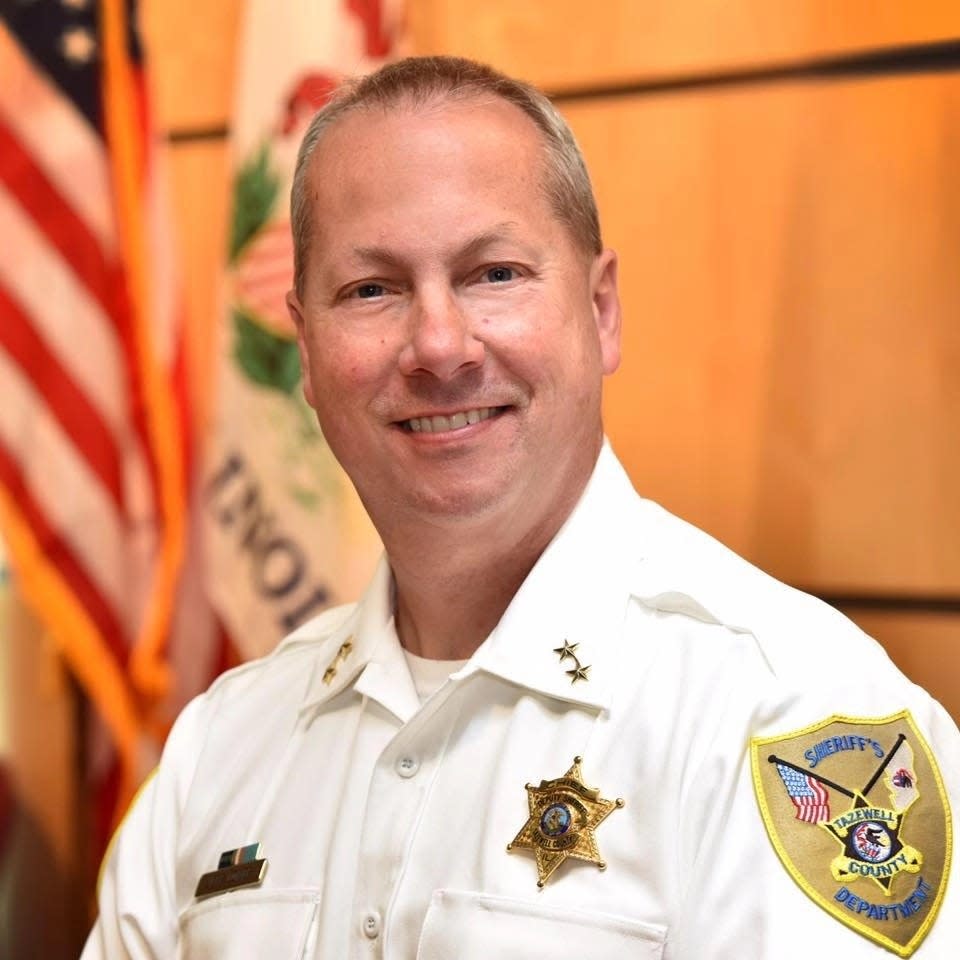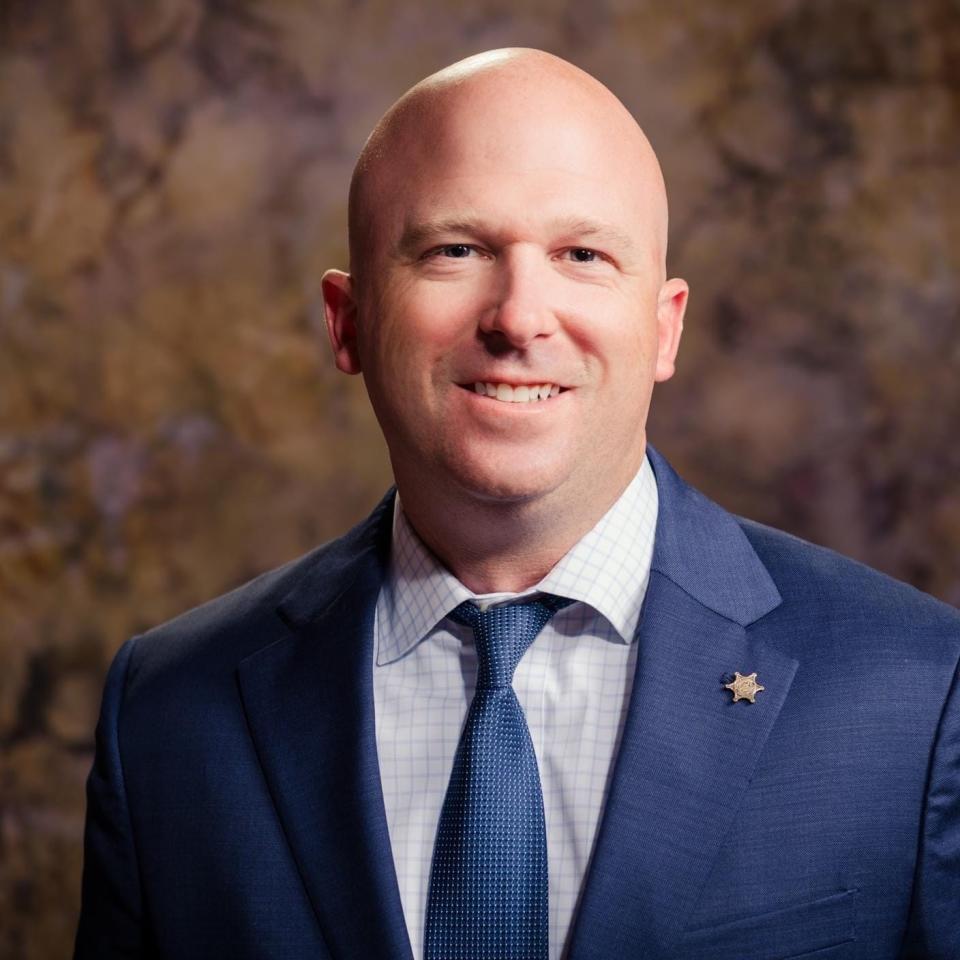Can Illinois sheriffs refuse to enforce new gun law? The court system will have a say
PEORIA — Law enforcement's reaction to the recent assault weapons law approved by Gov. JB Pritzker has been largely negative, with many sheriffs saying they believe the law is illegal.
More than 80 sheriffs, including those in Peoria, Woodford and Tazewell counties, have said they will not ask those with a valid Firearm Owners Identification card to register their weapons as required by the law. Others have gone further, saying they will not arrest people "solely for noncompliance with the act."
But can a sheriff refuse to enforce a law? Is it legal for a sheriff to decide what laws are legal, or is that the purview of the courts? The Illinois Constitution establishes the office of the sheriff and states that, in addition to duties and powers provided by ordinance, they also have the "duties, powers or functions derived from common law or historical precedent unless altered by law or county ordinance."

That has been construed by some to mean a sheriff has discretion. Dennis Tipsword, Woodford County's chief deputy and a newly elected member of the Illinois General Assembly, said his boss, Matt Smith, and other sheriffs can "question such a law until it is proven otherwise." He notes that before the law was passed, some Democrats — Tipsword is a Republican — were "on record saying they believed it would not pass constitutional muster."
The governor has noted that eight other states and Washington, D.C., also have bans on similar weapons.
The issue
At issue are provisions laid out in the Protect Illinois Communities Act, which bans assault-style weapons and high-capacity magazines from being manufactured or sold in Illinois. The bill also bans devices that can transform a semiautomatic weapon into a fully automatic one and requires owners of assault-style weapons to register those with the state.

According to Capitol News Illinois, "a gun owner’s failure to provide the state police with the serial numbers for assault-style rifles they own prior to Jan. 1, 2024, will be a misdemeanor, punishable by up to 364 days in prison. The degree of charges could increase based on the number of unregistered guns."
The idea of registering weapons seems to have caused the most concern. Jim Kaitschuk, the executive director for the Illinois Sheriffs' Association, said sheriffs shouldn't be investigating lawful gun owners; that's the purview of the Illinois State Police.

Peoria County Sheriff Chris Watkins issued this statement: "As the Sheriff of Peoria County, I oppose the legislative bill (HB 5471) that was recently passed banning law-abiding citizens from buying certain types of firearms. This is another example of Chicago policy being pushed downstate on responsible gun owners. This bill does not solve the root cause of the problem. The real focus should be on the Mental Health Crisis that’s plaguing our communities that I see increasing every day in Peoria County."
Watkins joined dozens of sheriffs statewide who released similar statements. Many of the statements were worded almost exactly the same and focused on Second Amendment aspects, saying the new legislation is unconstitutional. Tazewell County Sheriff Jeff Lower said in his statement that he would do everything in his power to "steadfastly protect the Second Amendment and all other individual rights guaranteed by the Constitution."
According to Capitol News Illinois, the sheriffs’ letters "primarily dealt with enforcing the registry portion of the assault weapons law, and Kaitschuk said he wasn’t aware of any sheriffs in his organization who don’t plan on complying with the law’s other provisions, like the ban of sales of assault weapons at Illinois gun shops."
Pritzker said that refusing to enforce the new law was not right and threatened to "fire" them if they didn't. He has called the sheriffs' positions and their letters as well as threats of lawsuits "political grandstanding."
"They took an oath of office to enforce the laws of the state of Illinois, and they will do so,” he said while speaking in Chicago this month. "These are folks who are entrusted by the public to enforce the law. They don’t get to choose which laws they enforce.”
On Jan. 17, the Illinois State Rifle Association, the Firearms Policy Coalition Inc., and the Second Amendment Foundation, along with two gun stores in St. Clair and McHenry counties, filed a federal lawsuit in the Southern District of Illinois against Attorney General Kwame Raoul and Brendan Reilly, who heads the state police.
And in Effingham County, Circuit Judge Joshua Morrison indicated he could rule by Friday whether he'll issue a restraining order sought by Thomas DeVore, an attorney who ran for attorney general last year who also filed several suits challenging the state's pandemic mandates.
DeVore filed the suit this week on behalf of an Effingham County gun shop, arguing the law sailed through the General Assembly in an improper manner.
What can sheriffs do?
Ed Yohnka, a spokesman with the Illinois Chapter of the American Civil Liberties Union, said sheriffs are to enforce the law, not interpret it.
"While it is true that, absolutely, a law enforcement agency can decide priorities for themselves, what they can't do is say, 'This crosses the line and we are not going to focus on this because it is unconstitutional,'" he said. "They can't pick and choose based upon their own sense of what is constitutional and what is not."
Tazewell County's Lower said his deputies are expected to use their common sense and their training to protect citizens within his county, but given the complexities of law enforcement, officers and deputies often have to use discretion on the streets. Yet, to him, the entire matter comes down to one thing.
"What do I have to enforce?" he asked of the new law, noting the ISP has been tasked with handling firearm sales and registration. "This is mostly regulatory, and that's the state police's mandate."
Kaitschuk said local sheriffs would be hard-pressed to know who owned such weapons unless those gun owners don’t voluntarily comply with the law, suggesting it would be ridiculous to go door-to-door to find out, according to Capitol News Illinois.
Regardless, Tipsword said, sheriffs answer to one group — the voters.
"No matter what is said on the political side of this, the sheriffs report only to the people of their constituencies," Tipsword said. "There is a mechanism if the constituents are not in favor of the stances these sheriffs are taking. That's our representative republic at work. they can vote them out."
This article originally appeared on Journal Star: Many Illinois sheriffs will not enforce new gun law. Is it that simple?

